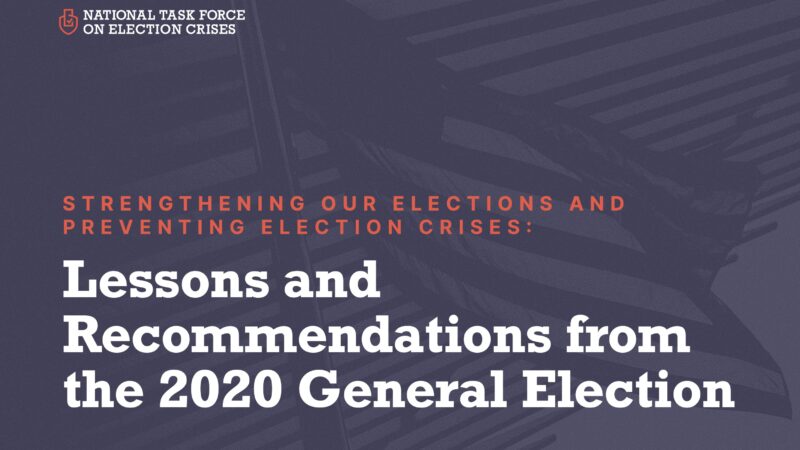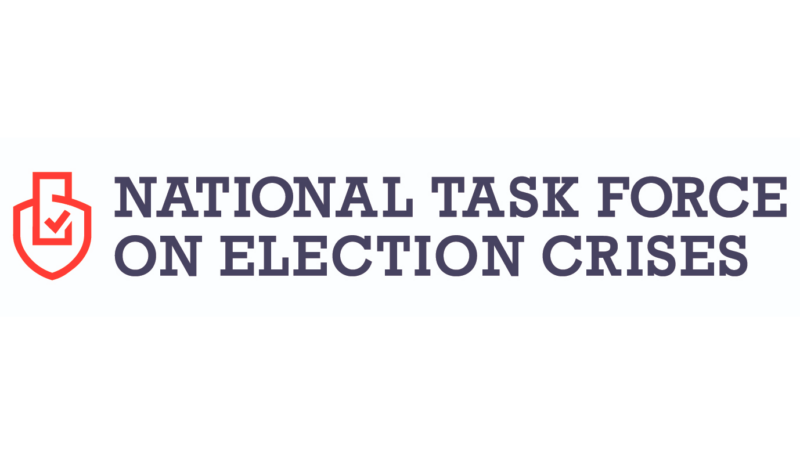National Task Force on Election Crises
- February 9, 2023

The National Task Force on Election Crises is a diverse, non-partisan, cross-ideological group of more than 50 experts in election law, election administration, national security, cybersecurity, voting rights, civil rights, technology, media, public health, and emergency response. Convened by Protect Democracy in 2019, the Task Force’s mission is to prevent and mitigate a range of election crises by calling for critical preventative reforms to our election systems and serving as a resource to the media and civil society. The only electoral outcomes the Task Force advocates for are free, fair, and safe elections in the United States.
Read the latest Task Force report: Lessons from the 2022 General Election Read the latest Task Force report: Lessons from the 2022 General Election
Visit the National Task Force on Election Crises website Visit the National Task Force on Election Crises website
The Task Force’s latest recommendations:
Election Administration and Security
- Sustain and expand crisis-tested voting options, including early voting and mail-in voting
- Ensure sufficient funding for election administration including equipment, supplies, security, personnel retention, and educating voters about election mechanics
- Better protect voters, election workers and officials from threats of violence and intimidation
- Community leaders and stakeholders should engage with law enforcement and local elected leaders throughout the voting period, to develop plans for protecting public safety and the right to vote in ways best suited to the needs of the community, including communities of color
- Continue efforts to prevent cyber or other attacks by foreign adversaries or domestic disrupters
- Recruit poll workers on an ongoing basis, reflecting the full diversity of communities
- Where possible, speed up processes for determining results, including legislation or other necessary measures to allow for expanded pre-canvassing of absentee ballots
- Review deadlines to request and return mail ballots for possible clarification or improvements to ensure they are consistent with postal delivery standards and local election rules, and will be counted
- Continue best practices of transparency and trust-building
- Require paper ballots that voters can review before submitting to ensure trust and facilitate appropriate audits
- Decline attempts to expand electronic ballot return, inappropriate hand-counting, and other insecure or inaccurate practices
Legal Reforms
- States should examine election emergency statutes and where appropriate make updates to provide more predictable and depoliticized means of election modification for emergency situations, and where necessary to conform with the Electoral Count Reform Act
- States should improve statutory protections for election officials and their families
- Hold candidates and their attorneys accountable for knowingly pursuing bad-faith or frivolous legal challenges; continue to pursue accountability for those who committed criminal acts on and leading up to January 6th
Social media platforms and news media
- Downgrade or delete rather than label election-related disinformation, and speed up processes for labeling/removing posts
- Hand-pick or remove trending lists and up-next recommendations for election-related content
- Continued media transparency and responsibility in projections
- Invest in coverage of election issues in 2023 county and local races
Civil Society
- Business, faith, labor, and cultural leaders must stay engaged in supporting free and fair elections, especially at the local and county levels
- Increase investments in work to prevent political violence, including through projects to research and defuse intense polarization that can lead to violence
- Increase investments to identify the best methods to inoculate against disinformation about voting options and the validity of election results
- Civil society must still prepare for the worst, closely follow potential threats, and be ready to speak out and act if an election crisis emerges
Though some of these recommendations stem from the specific experience of the 2022 election as well as emerging issues, other recommendations (e.g. election funding) reflect responses to systemic vulnerabilities in our election systems. It should also be noted that many individual Task Force members and organizations endorse a wide range of additional actions to improve elections in the United States beyond those enumerated here for a variety of considerations, including to advance voting rights and nonpartisan election administration, as well as to improve election operations and election security. This list is scoped to constitute the consensus recommendations of Task Force members for the specific purpose of preventing and preparing for future election crises.
Recent Task Force Resources
Related Content
It can happen here.
We can stop it.
Defeating authoritarianism is going to take all of us. Everyone and every institution has a role to play. Together, we can protect democracy.
Donate
Sign Up for Updates Sign Up for Updates
Explore Careers Explore Careers
How to Protect Democracy How to Protect Democracy





